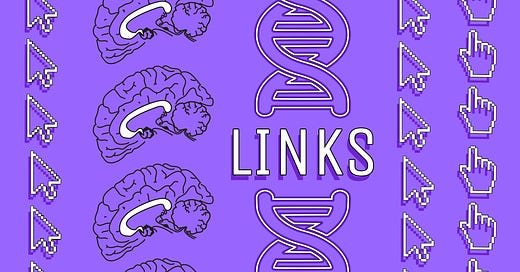LINKS - September 7th, 2022
Welcome to LINKS — my attempt to provide Rhapsody readers with five interesting stories that tell us something about what it means to be human. LINKS is published every Wednesday. Have a link you want to share? Drop it in the comments.
Prehistoric child’s amputation is oldest surgery of its kind
“Discovered on the island of Borneo, the remains pre-date the previous oldest known case of limb amputation by more than 20,000 years and indicate that the individual survived for several years after the surgery. The finding, published on 7 September in Nature, suggests that some ancient people were proficient nurses and performed sophisticated medical procedures much earlier than scientists have thought.”
Are All Brains Good at Math?
“Some scholars argue that American culture’s saturation with negative stereotypes around math in combination with current approaches to teaching the subject are perpetuating anxiety, making some kids think they are bad at math, and preventing them from excelling. Research shows that humans are born with an inherent sense of numbers, known as numerosity. The concept of numerosity is one of the only high-level cognitive functions that is mapped to a specific region of the brain. In other words, we are primed to do basic math, but culture gets in the way. Recent neuroscientific, behavioral, and cognitive research could help us redesign math education so that it supports rather than undermines learning—and even inspires a love for the mysterious elegance of math along the way.”
Indigenous Americans ruled democratically long before the U.S. did
“Institutions such as these highlight a growing realization among archaeologists that early innovations in democratic rule emerged independently in many parts of the world. In specific, these findings add to evidence that Native American institutions devoted to promoting broad participation in political decisions emerged in various regions, including what’s now Canada, the United States and Mexico, long before 18th century Europeans took up the cause of democratic rule by the people.”
SETI Pioneer Frank Drake Leaves a Legacy of Searching for Voices in the Void
By Lee Billings, Scientific American
“‘Frank founded an entire field,’ says astrophysicist Andrew Siemion, director of the Berkeley SETI Research Center (BSRC) at the University of California, Berkeley. ‘He played a crucial role in creating the framework through which we can apply the tools of astronomy and physics to understanding and answering existential questions. But he never lost his humility and generosity. When our descendants look back centuries from now, I think they’ll rank Frank among the greatest scientists who ever lived.’
How Nature Nurtures the Brain
By Sebastian Ocklenburg, Ph.D., Psychology Today
“A new study, published in the journal Molecular Psychiatry (Sudimac et al., 2022), focused on precisely this question. In the study, entitled ‘How nature nurtures: Amygdala activity decreases as the result of a one-hour walk in nature,’ a research team led by Sonja Sudimac from the Max Planck Institute for Human Development in Berlin investigated how stress-related brain regions reacted to a one-hour walk in an urban environment—a busy street in Berlin—compared to a natural environment; in this case, a forest.”




